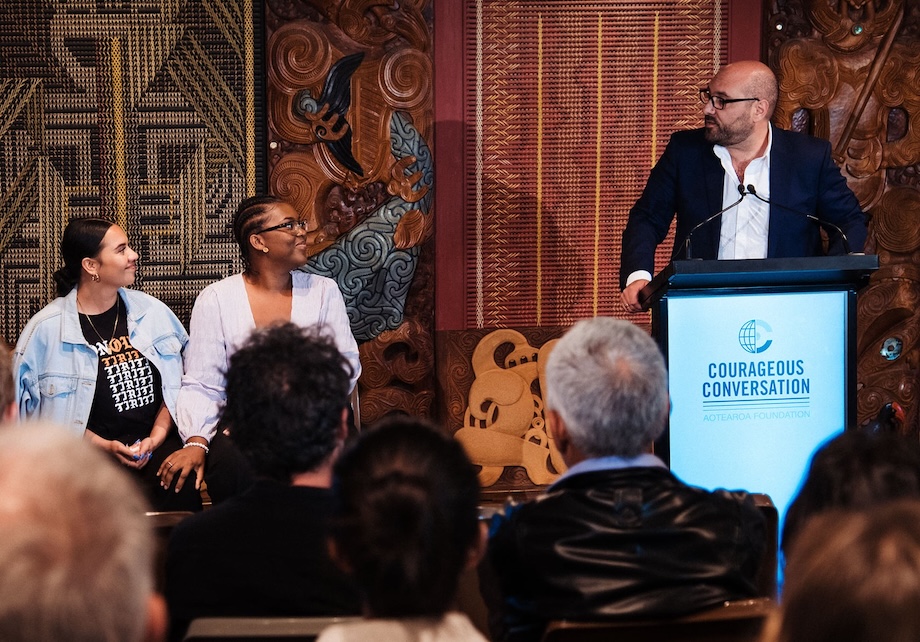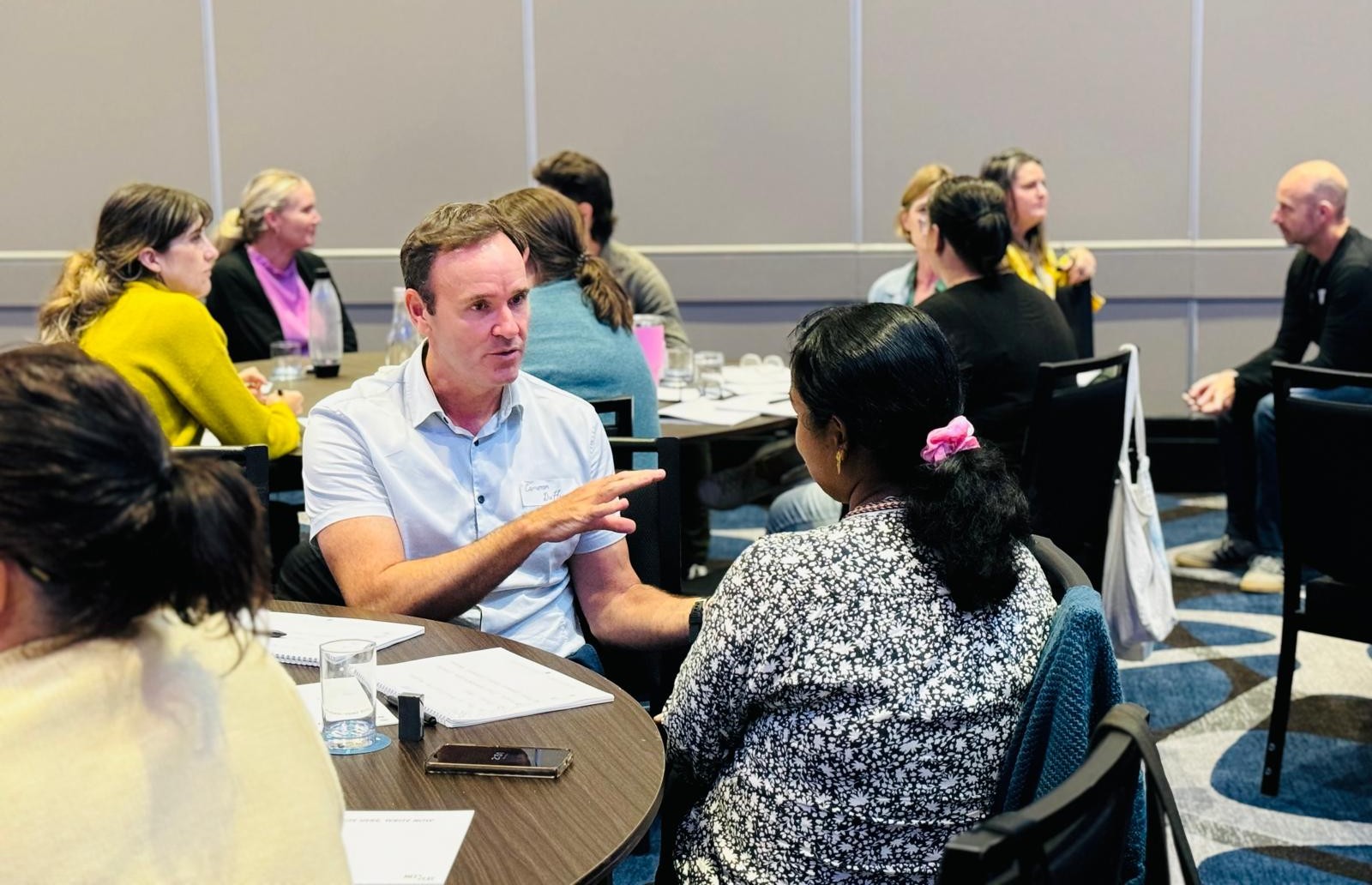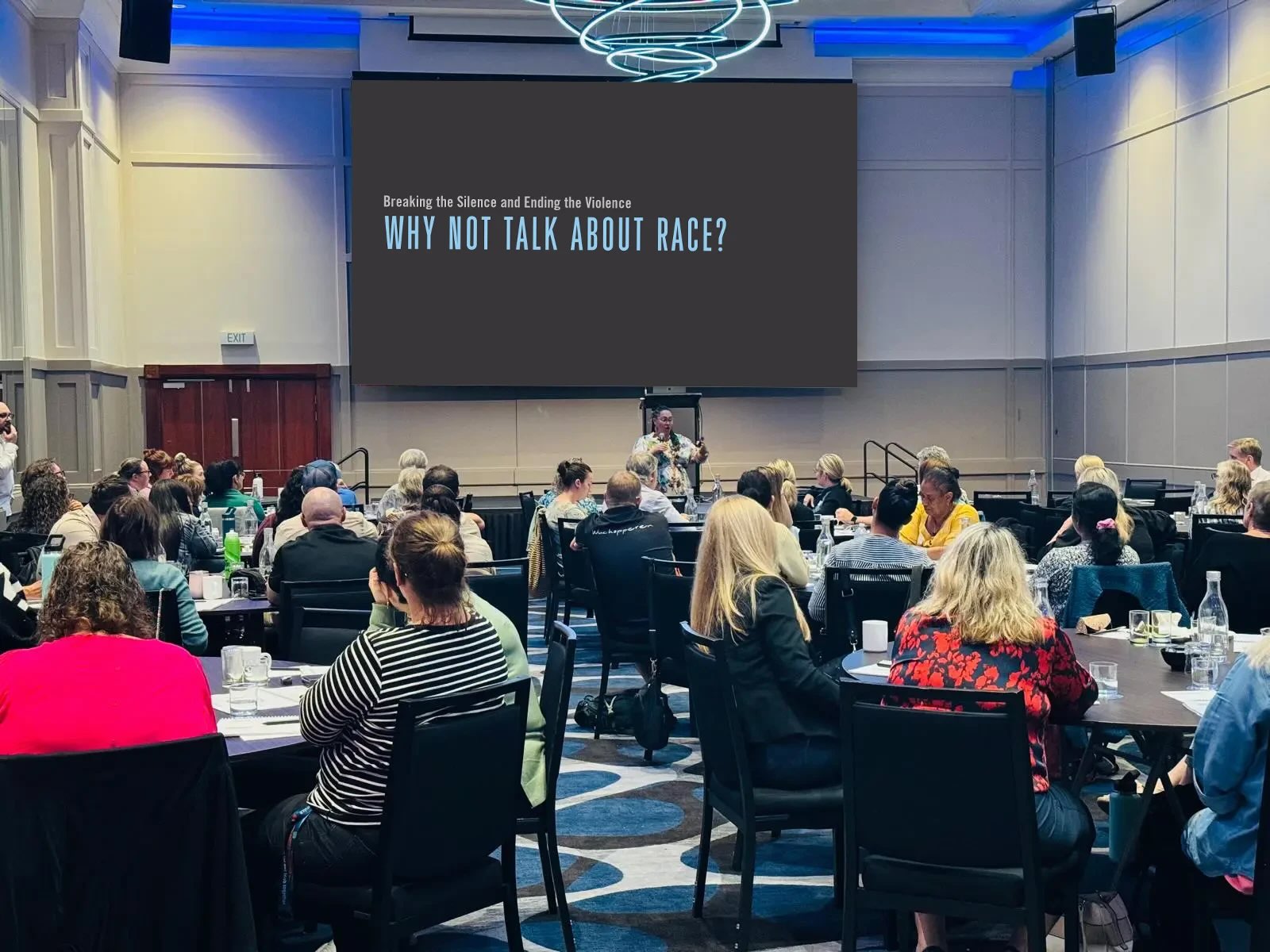CB Q&A with Dr Mathew Farry, MD, Courageous Conversation South Pacific Institute on DEI’s Evolution + Advertising’s Role in Driving Change

Campaign Brief speaks with Dr. Mathew Farry, Managing Director of Courageous Conversation South Pacific Institute®, a racial equity and professional development organisation in Aotearoa and Australia, about how it’s reframing DEI – and what that means for the future of advertising and creative leadership.
Can you tell us about the mission and core values of Courageous Conversation South Pacific Institute® and the kind of work you do?
Our mission is to enable people of all races to achieve at their highest level and live their most empowered lives. Although created more than thirty years ago in the United States of America, by African American author, educator and entrepreneur, Glenn E. Singleton, our core values are perhaps best expressed in our commitment to the principles of Te Tiriti o Waitangi, Mātauranga Māori and tikanga. Such profound value systems, incorporating core values such as whanaungatanga, tika, pono, aroha, rangatiratanga, manaakitanga form the basis of our methodology and provide us with a blueprint that offers unique solutions.
The Courageous Conversation South Pacific Institute® pursues a Te Tiriti-based decision-making process, and we believe that a Te Tiriti led Aotearoa benefits everyone living in this land, while offering a blueprint for other settler-colonial nations to follow.
The vast array of cultural capability workshops on offer tend to focus on race as something external to ourselves. They examine such things as the theoretical aspects of race/racism, problem definition and evaluation, and promoting cultural capability skills. This is especially true about defining the role for Pākehā who traditionally see race as something that affects and is about Indigenous people and people of colour. In Courageous Conversation®, Pākehā people, as well as Indigenous people and people of colour, come to understand their own racialised selves and the important role that race plays in each of our lives.
While Courageous Conversation® draws on contemporary race theory, our Protocol demands, as its very First Condition, that practitioners establish a racial context that is personal, local and immediate. In other words, participants’ stories must be drawn from their lived experience, from the micro as well as the macro spaces in their lives. The Courageous Conversation® begins with you. It is from our knowledge of self that we transform the systems we are a part of, one workshop, one conversation at a time. As such, it is both transformative and healing.
Courageous Conversation® has at its foundation, knowledge of self. This was formalised here in the South Pacific, drawing on tikanga Māori, specifically whakawhanaungatanga, where people bring their full selves, their full story into the space. This sets a foundation of trust and connectivity. Our Protocol enables people to engage in a Courageous Conversation About Race® that is positive, connected and uplifting, “calling people into the conversation” rather than “calling them out”.
The Courageous Conversation begins with you, and this facilitates healing, enabling participants to move from a place of compliance and paralysis to a place of truth, authenticity and genuine empowerment. Our entire Protocol is designed to ensure that everyone leaves the initial experience with tools to use in their daily lives, and with a clear idea of how to move forward with their racial equity journey. The aim is for participants to leave our workshops feeling empowered, positive, excited and motivated to share what they have discovered with their work colleagues and whānau.

This emphasis on self-knowledge is an important feature, distinguishing our work from other available training. For us, a key factor preventing individuals, communities, and organisations from being able to connect and thrive is our inability to fully comprehend the ways in which race impacts our personal and professional lives. Regardless of how much Donald Trump insists that the US is now a “colour blind” society, or ACT party leader David Seymour promotes the same idea with his now defeated “Treaty Bill”, we know that race is a powerful social dynamic, affecting every aspect of everyone’s lives in Aotearoa New Zealand and worldwide.
Courageous Conversation is designed to transform beliefs, which is essential if we are to change behaviours and results. Systemic transformation is not merely a statistical exercise or a response to internal or external pressures. Rather, it is grounded in intentional efforts to create and sustain an organisational culture where everyone can thrive as their most empowered selves. It is a systemic engagement, rooted in skills-based practice, which shifts the mode of operation from reactive to generative. Participants speak about their experiences, gain powerful insight, and build a culture that matches their mission. This unleashes the type of curiosity and creativity which fosters inclusion, belonging, productivity, problem-solving and meaning-making that produces extraordinary outcomes.
One of conventional DEI’s shortcomings has been its failure to meaningfully address the issue of systemic racism. Workshop after workshop, this issue remains the proverbial elephant in the room. Not surprisingly, many DEI initiatives fail to achieve the type of transformation they aspire to, and perhaps this is a reason why public reaction to the term DEI has soured in recent times. A problem lies in the framework and methodology employed. First and foremost, placing the issues of race, racial identity development and systemic racism on the table for discussion is another important distinguishing factor of Courageous Conversation®.
What are the biggest challenges you’ve encountered when promoting this work in industries like advertising?
Many of the same challenges exist in the advertising industry that we have encountered in many industries, when it comes to achieving racial equity, diversity and inclusion. First, there is, like I mentioned, the bad rap that DEI is getting, largely as a result of the dominant DEI frameworks. After a lot of money spent and a lot of workshop hours scheduled, many organisations do not feel they have achieved any real and meaningful transformation. Secondly, there is the operating belief that somehow DEI limits or excludes the idea of meritocracy.
Regarding this issue of meritocracy, we have never said that one’s race is a sufficient reason for hiring. However, regardless of the ethical perspective, and from a purely commercial perspective, if your team, especially creative teams, are not a reflection of the society they function in, the authenticity, and therefore impact of what they produce, will suffer.
When you create an environment that allows and enables people of all races and ethnicities to reach their fullest potential, unhindered by bias and discrimination, you unleash creativity that spills into every area of their performance. Whether it is creating advertisements, or at the other end of the spectrum, something like medical research or construction, creativity is imperative when it comes to quality of performance. There is sufficient evidence now to confidently claim that when people feel truly empowered, it unleashes the type of creative genius that enhances problem-solving, leads to better decision-making, increases productivity and flexibility, stimulates innovation, and simply results in better all-round performance.

Chandler Macleod, one of Australia’s oldest and largest recruitment agencies admits that DEI initiatives have dramatically enriched workplaces and driven business success. There can be no doubt that organisations that view diversity, equity and inclusion as both a moral imperative and a strategic advantage are better positioned to attract top talent, drive innovation, and navigate marketplace complexities. And that is Chandler Macleod executives speaking, not an industry of DEI practitioners.
The stats show that corporations identified as more diverse and inclusive are outperforming their competitors. Australian Manager and Consultant, Taîss Quärtápa rightly argues that when a corporate entity is able to transcend its traditional confines, evolving into a dynamic force that integrates diverse perspectives, it significantly enhances organisational performance and success.
In July 2023, in their report ‘Lighting the Pathway to Change’, Champions for Change warned New Zealand business leaders that they will fall behind if they are not taking steps to prioritise diversity, equity and inclusion now.
Antonia Watson, CEO of ANZ New Zealand points out that we cannot continue to create our businesses based on what’s worked in the past or what’s even working now. We need to be looking at the future – who are our future workforces, what do they value, how can we inspire them and enable them to reach their potential.
How do you approach starting these often difficult or uncomfortable conversations around race, gender, and equity in corporate or creative environments?
You are quite right, conversations about race in a corporate or creative environment are “often difficult and uncomfortable”. This is precisely why our Protocol is designed to guide us in having conversations about race that are uplifting, liberating and that inspire transformation. By deepening participants’ personal racial consciousness, we equip them to answer the call to action, “What will I try differently tomorrow?
This conversation and personal awareness is imperative because Courageous Conversation precedes courageous leadership, and courageous leadership is vital if we are to achieve racial equity.
On our website, we state that the transition to authentic racial equity is an unapologetically top-down process. It enjoins executive leaders, directors, managers and staff members to become responsible for transformation processes in their teams and communities. Processes that are systemic, adaptive, critical, and most of all courageous.
In what ways do you see the advertising industry evolving in terms of embracing diversity and inclusion? What more needs to be done?
In relation to the advertising industry in Australia and Aotearoa New Zealand, DEI is relatively new, however, we are getting more and more inquiries from advertising agencies and other corporate entities. They themselves are catching on, coming to the realisation that a work environment where people of every race and ethnicity can achieve at their highest levels is inarguably good for business. Courageous Conversation North America, first worked with Wieden+Kennedy in 2014 and continues to partner with their USA and European offices today. Our award-winning work in the advertising industry has garnered recognition by AdWeek, AdAge, AdColor, the AdCouncil and numerous iconic creative agencies.
As mentioned above, when everyone thrives, the result is a dynamic and empowered team that works effectively together to achieve extraordinary outcomes. Quite simply, the days of all-white advertising execs and creative teams who bring in an Indigenous person to consult, you know, run things by them at the end of the creative process, are over.
Over not only because it is the wrong approach from a moral standpoint, but rather because it is very limiting in terms of creating authentic work that resonates in an impactful way. Non-White people are an ever-increasing and important segment of the market, not only in terms of their buying power, but also in terms of the dominant role they play in shaping culture worldwide. And therein lies the power of Courageous Conversation. Our ground-breaking Protocol enables participants to transition to that space where we genuinely see the intrinsic value of every human person. A space where we can finally live and work together in a way that enables all of us to excel, free from the division and fear that plagues us. This produces amazing results.
When the CEO of Colenso BBDO, Angela Watson approached us, she told us that she had experienced too many DEI strategies that were just box ticking exercises. She said she was looking for a meaningful experience for her team. After we delivered our foundation workshop to Colenso’s entire staff, she reported that it was not only beneficial for them personally, but it had a powerful impact on their work. She said that changing the way they related to each other fostered a more creative, synergetic and productive environment, which most definitely improved the quality of what they produced, and this is being noticed by existing and potential clients.
Internationally, the advertising industry and other corporate entities have long recognised the benefits of what we do. This is why many corporate bodies, despite President Trump’s denouncement of DEI, have publicly stated their determination to maintain their commitment to these practices. Worth restating…the Courageous Conversation US team has provided advice and coaching to executives at global powerhouses such as Wieden+Kennedy (W+K) Advertising, Google and Amazon, Their impactful partnership with W+K garnered the prestigious 2017 Most Valuable Partnership (MVP) Award by AdColor, and was further recognized by the AdWeek/AdColor 2020 Champion Award, and the 2021 Ad Age Creativity Awards Diversity & Inclusion Champion of the Year.
Could you share any success stories or standout moments where Courageous Conversation has helped transform a workplace or industry group in a significant way?
Since our establishment in 2016, the Courageous Conversation South Pacific Institute (CCSPI) have worked with numerous organisations throughout Australia and Aotearoa New Zealand, including government ministries and agencies, hospitals and health services, city councils, schools and tertiary institutions, NGOs and corporate entities and there are many success stories.
CCSPI has been the recipient of many awards, and MBIE and Gold Coast Health won prestigious awards for the work they undertook with us, but more importantly, we have facilitated hundreds of organisations in their transition to authentic racial equity and inclusion. Your readers should check our website at courageousconversation/southpacific.com for testimonies from our many clients.
However, since we are focused here on the advertising industry, let me highlight the success story of one of Aotearoa New Zealand’s largest and best-known advertising agencies, Colenso BBDO. So successful was our work with them, that CEO, Angela Watson, and Indigenous Creative Practice Lead, Hāmiora Bailey, share their thoughts on Colenso’s transformational journey in an upcoming book on the work of Courageous Conversation in Aotearoa New Zealand.
It is an interesting case study and when the book is published, we would love to offer Campaign Brief Colenso’s case study to publish as an excerpt from the book, because we think you will find that it outlines the way forward for the advertising industry and from leaders within that industry, rather than from me.
What role can advertising agencies play in fostering more equitable and inclusive cultures, both internally and in the work they create?
The answer to this question is clear, the work of advertising agencies involves representation of us and the society we live in together. The way we are represented plays a huge role in shaping the way we think and the biases we hold onto or debunk. Of course, in order to foster a more authentic, equitable and inclusive societal culture, we have to transform ourselves and our workplace cultures first. If we achieve this, it will automatically transform what we produce.
How do you think we can ensure that male voices are more prominent in supporting DEI efforts in the advertising industry?
By emphasising that this is a problem that affects us all. Actually, if we don’t do this work, it is our children that will suffer, so it is very much every parent’s responsibility. And men are speaking up. Only the other day, in response to Trump’s executive orders reversing DEI initiatives, two of the US’s most prominent Black male business leaders issued a public warning. Ken Frazier, former CEO of pharmaceutical giant, Merck, and Ken Chenault, former CEO of American Express, said that companies turning their backs on strategies to promote DEI will hurt the next Ken Frazier and Ken Chenault’s chance of climbing the ranks of Corporate America. Given (White) men hold the largest number of C-Suite positions and thus possess the authority to inspire transformation throughout the corporate sector, they must also be developed, supported and held accountable to embracing their responsibility to lead this important change.
What would you say to agencies or companies that are hesitant to engage in conversations about race, equity, or inclusion? How do you encourage them to get started?
The first step is to contact us and let us begin the conversation with a free, no obligation consultation.
What initiatives or partnerships are you most excited about right now at Courageous Conversation?
Courageous Conversation South Pacific Institute is most excited by the increased interest in our work from advertising and other industries. Corporate entities in New Zealand and Australia are increasingly realising that the work we do is integral to them achieving peak performance and productivity. In addition to the moral aspect, our work impacts your bottom line.
How can individuals and companies in the advertising industry get involved with or support the work you’re doing?
Contact us at southpacific@courageousconversation.com and let the conversation begin!
